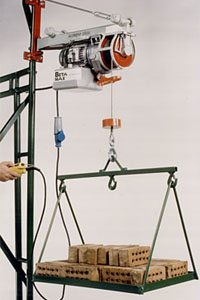Using Hoists Instead of Cranes
By Masonry

Despite the benefits of cranes, they're not always the best machine for the job, or available on every job site. Sometimes, a hoist can serve the same purpose, saving mason contractors money. A hoist continuously lifts materials to the workers as they lay brick, block or stone. It makes the scaffolding system self-sufficient, virtually eliminating the need for a crane.
"A hoist serves the mason by keeping the materials moving throughout the day, and you don't have the expense of the crane and operator," said Tami Hamilton, vice president of marketing for Beta Max Inc. in Melbourne, Fla. "The biggest selling points hoists have over cranes are really the expense and the dedicated time to use them."
Some scaffolding can't support the additional weight of large placements of masonry materials, which defeats the purpose of having a crane set them next to the workers.
"If masons are working on frame scaffolding, it may not be able to have heavy pallets of brick set on the work space," Hamilton said.
Even when heavy-duty mast climbers are used that can support the extra weight, cranes are not necessarily needed. A hoist can be easily mounted to the scaffolding to provide a continuous supply of materials.
"When bricklayers are working, the hoist keeps feeding the platform," said Jean Sebastien, technical services and project manager for Fraco Products Ltd. in St-Mathias-sur-Richelieu, Quebec, Canada. "All the bricklayers keep working so production is never stopped."
Last fall, Fraco introduced its new hydraulic, portable hoist, the FRH-4000, which the company technically calls a crane. It can comfortably handle 4,000 pounds of capacity, carry loads at 70 feet per minute, and lift them up to 330 feet. The hoist has 180-degree pivot capabilities that allow safe positioning of materials on both sides of a mast climber. The boom is higher than previous models, so the hoist will lift the load over the work platform's guardrails.
The hoist attaches to the mast climber's frame platform with four bolts in about 15 minutes. Instead of having an independent engine, the hoist shares the mast climber's power pack, using power on-demand.
"It is using the same power as the machine. It quickly connects to the mast climber and uses the same hydraulic fluid," Sebastien said. "It's not another power cost."
Beta Max's Gemini Plus portable hoist mounts to scaffolding or I-beams and has a non-rotating cable to keep loads from spinning. A single line can lift 600 pounds at 80 feet per minute up to 220 feet. A double line can lift twice that weight at 40 feet per minute up to 110 feet.
"You're moving smaller amounts of materials, but you're moving them throughout the day," Hamilton said.
The company's Maxial Track Hoist system is designed to lift loads in confined spaces. It works with frame or systems scaffolding, lifting up to 450 pounds at 80 feet per minute to a height of 350 feet.
Hamilton points out that masons can recoup the cost of a hoist — costing approximately $5,000 — on a single, large job by eliminating or significantly reducing crane time.
About the Author
Masonry, the official publication of the Mason Contractors Association of America, covers every aspect of the mason contractor profession - equipment and techniques, building codes and standards, business planning, promoting your business, legal issues and more. Read or subscribe to Masonry magazine at www.masonrymagazine.com.


















